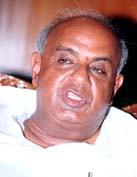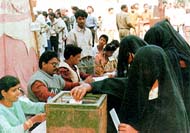Commentary / Mani Shankar Aiyar
The middle class has brought this dreadfully pedestrian Age of Gowda upon our head
 The politicians of Pakistan are thus the marionettes of the armed forces. They play out their part, and usually before that part is quite finished, the army moves into cancel the show and put on the next episode.
The politicians of Pakistan are thus the marionettes of the armed forces. They play out their part, and usually before that part is quite finished, the army moves into cancel the show and put on the next episode.
Zulfiqar Ali Bhutto became chief martial
law administrator because the army wanted it. He ceased to be prime
minister because the army wanted it. Benazir became prime minister
in 1988 because the army decided it was time to return to barracks.
She was returned to Larkana when the army started getting restive
in barracks. Nawaz Sharif got his moment in the sun because the
army let him. He went and Benazir got back because that is how
it played in the military messes. And now that the army has decided
that enough is enough, Benazir has exited again to Larkana and
will moulder there till -- and if -- she is summoned again.
In Pakistan, those who live by the epaulette perish by the epaulette.
Yet, because Pakistan is so similar in history, culture, tradition
and ethos to India, the democratic desire which comes so easily
to us comes easily to them too. Even the army would, I think,
be happy to let politicians get on with politics if only they
would establish some ground rules among themselves and evolve
some kind of a consensus that they will not turn to the umpire
to tilt the scales every time the going starts getting a little
rough.
That can happen only if they agree that Islam is not enough,
ethnicity needs to be respected, sectarian extremism needs to
be resisted, foreign adventures ended and defence expenditure
refracted through the prism of national economic needs.They will
also need to end feudalism in agriculture and oligopoly in industry
if they are to forestall cosy nexuses from developing between
ruling elites and the military establishment.
All this is a pretty
tall bill of fare. It is, therefore, probable that Pakistan's
second 50 years, will be quite as turbulent as the first 50.
And what of us? Our next half century could match Pakistan's in
turbulence unless we are very, very careful. Democracy has survived
because Nehru eliminated feudalism, not, as he himself might have
said, 'wholly or in full measure but very substantially.'
We quickly became a middle-class democracy and, bar the occasional
Madhavrao Scindia or Gopinath Gajapathi, established early on
that high birth and too much wealth was a burden not a qualification
for advancement in a democracy.
Like Frankenstein's monster, it is this middle class, the creature
of our democracy, wrinkling up its collective nose in disdain
and disgust at politicians and the political process, lapping
up tales of political speculation and delighting in bringing the
system into disrepute. It is this class that has begun to look
for extra-democratic nostrums.
It is this class, united in rejecting
the present dispensation but divided over what to replace it with,
that is returning fractured verdict after fractured verdict, rendering
the polity progressively ungovernable. It is this middle class
that has brought this dreadfully pedestrian Age of Gowda upon
our head.
 In 1996, India's democracy is approximately where Pakistan's was
between Liaquat and Ayub, the seven fractious years from 1951
to 1958. The electorate is turning its back on national parties
at the national level and treating election time as vengeance time.
In 1996, India's democracy is approximately where Pakistan's was
between Liaquat and Ayub, the seven fractious years from 1951
to 1958. The electorate is turning its back on national parties
at the national level and treating election time as vengeance time.
Systemic instability combined with popular disillusionment is
an incendiary combination. Wise counsels could have prevented
Pakistan from sliding into the easy solutions of an authoritarian abyss
of 1958. We must stuff our ears against the siren sounds which
suggest that one Khairnar or one Alphonse is worth a shelf-full
of politicians.
Instead of moral pulpits, the Seshans must be made to mount the
hustings. If Manmohan Singh can make it to the top in a party which
has nursed 22 indicted ministers, it is irresponsibility of the
highest order to go on saying that there is no place for good
men and women in our democracy. There is. But one can only bring
good people to the water. It is for them to make themselves drink.
|





 The politicians of Pakistan are thus the marionettes of the armed forces. They play out their part, and usually before that part is quite finished, the army moves into cancel the show and put on the next episode.
The politicians of Pakistan are thus the marionettes of the armed forces. They play out their part, and usually before that part is quite finished, the army moves into cancel the show and put on the next episode.
 In 1996, India's democracy is approximately where Pakistan's was
between Liaquat and Ayub, the seven fractious years from 1951
to 1958. The electorate is turning its back on national parties
at the national level and treating election time as vengeance time.
In 1996, India's democracy is approximately where Pakistan's was
between Liaquat and Ayub, the seven fractious years from 1951
to 1958. The electorate is turning its back on national parties
at the national level and treating election time as vengeance time.